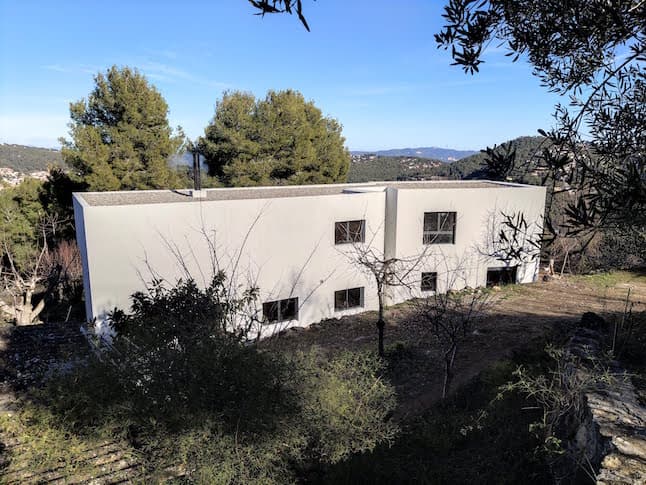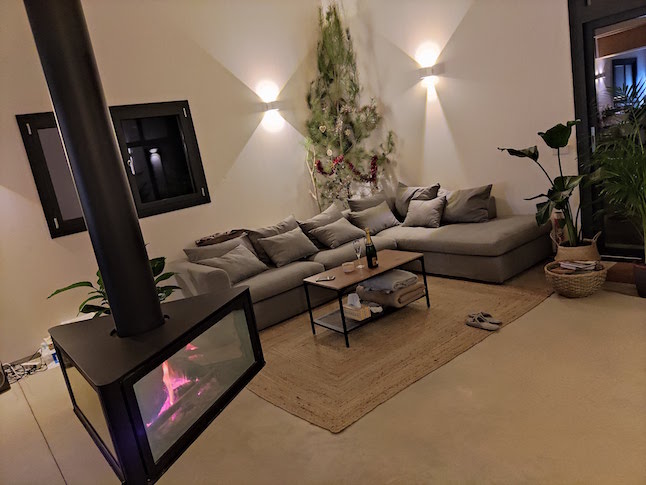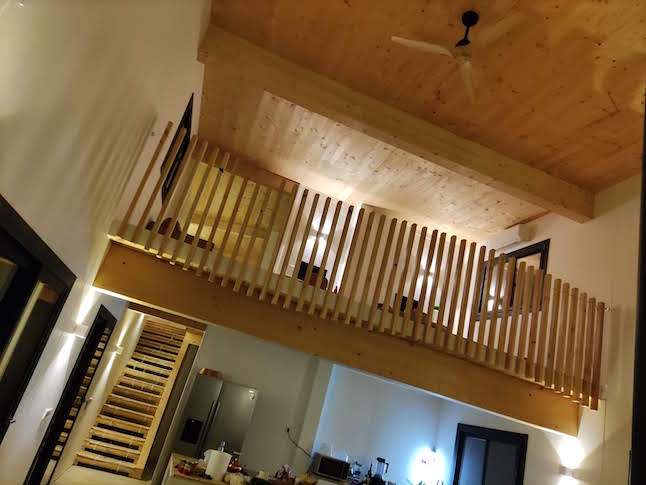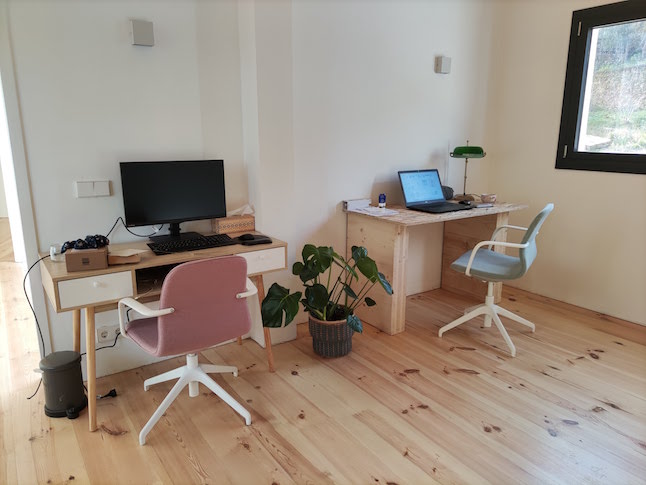Property in Spain: What's it like to build your own house?

Many people move to Spain in the hopes of buying property, but what about those who have decided to build their dream house here instead? We spoke to one reader who has done just that and asked him all about his experience.
Jerome Cathaud undertook the mammoth project of buying a piece of land and building his own house in Spain. He decided on a small town around a 25-minute drive outside of Barcelona because of "its proximity to the city, natural spaces and affordable plots to buy".
Approximately how long did it take to complete the project?
If I start from the time when I started seriously searching for a plot of land, until the completion of the house to a level where it was liveable, then the project took approximately 2.5 years.
The plot search took around two to six months, followed by six months of negotiations and paperwork until the land was mine. Then it took a further six months to draw up plans for the house and apply for the permit.
Construction took nine months as it was constructed using pre-built wood panels. This wasn’t bad at all, considering a lot of it was done in 2020 during Covid.
Property in Spain: The different ways to buy a home (and their pros and cons)
Did anything surprise you about the process of building a house in Spain?
Many things! Firstly, you cannot get a mortgage for the 'full project', meaning if you plan on buying a plot and building a house, the bank will only lend you about 80 percent of the cost of the construction, but nothing for the plot itself.
You should have enough liquidity to buy the plot and then enough to kick start the construction. The positive side of this is that it drives the prices of the plots down, as fewer people can afford a house construction project.

What's it like to build your own house in Spain? Photo: Jerome Cathaud
In Spain, it also is mandatory to hire an architect to build your house, and their fee will range from €10,000 to €30,000, depending on who you are talking to (and where). It is a significant part of the budget for your project.
A lot of plots defined as residential plots (terreno urbano) where you can apply for a permit and build a house, aren't actually able to be used. This is because your Town Hall may not currently be granting building licences at this time.
You need to triple-check with the local authorities if they are granting construction permits at the time you want to build or if these permits are 'frozen'.
READ ALSO: The real cost of buying a house in Spain as a foreigner
Pretty much every professional you talk to will send you a quote without the sales tax included (IVA).
It is very frustrating because you need to add either 21 percent (all the consulting fees, such as the architect), or 10 percent for the construction itself (new constructions only have a 10 percent sales tax, which is quite welcome when you launch a project like this).
What were the most difficult/frustrating things involved in building your own house?
Probably the most frustrating thing, and they were many, was the administrative side of things.
Getting all the permits and licences to build the house was very stressful and slow due to the opacity of the system in Spain. Every town has its own way of dealing with it, and the timing of response is very unpredictable.
READ ALSO - Property in Spain: What I wish I’d known before buying a rural retreat to renovate
Communication was also difficult between the architect in charge of my project and the Town Hall (Ayuntamiento), everything takes a long time and there is a lot of back and forth between the parties involved because there always is some missing documents or small mistakes from the architects which are holding up the process.

'Your architect may have great ideas, but it's your house, not theirs'. Photo: Jerome Cathaud
Applying for a building licence is very paperwork-heavy. Our project (proyecto ejecutivo) was about 400 pages, to give you an idea. On one hand, it is very exhaustive and solid, on the other, it is too complicated and heavy for a simple family house. Thankfully, the architect is the one who is in charge of producing this document.
Therefore not knowing when you will be able to start construction on the house and being kept in the dark by the town administration (and sometimes your own architect) is definitely the most frustrating thing.
What tips and advice would you give to others wanting to build a house in Spain?
- Do a lot of research on the overall process before starting it, and make sure you have your finances in order.
- Double-check that you can build on the plot and also check costs related to it (road traffic, landscaping, sewage system, water, electricity lines and internet cables etc.)
- Negotiate everything and always make sure that contracts/quotes are "definitive" (presupuesto cerrado).

What do you need to know when building your own home in Spain? Photo: Jerome Cathaud
- Minimise the number of entities involved in the project construction. A construction company that offers llave en mano (key in hand) might be the ideal way forward, however, you will generally pay an extra 20 percent for this.
- Be very careful about your architect's design and ideas. You can have a great architect, but never forget that it is your house, not theirs. You are the one who needs to pay for it and you will be the one living in it. Often they might be interested in adding a cool project to their portfolio, but you might not be able to afford it, even though they reassure you by saying it fits in your budget. When it comes to choosing an architect, make sure it's someone who understands you and the budget you have, and ask to talk to a few of their former clients - if they refuse, run!
Comments
See Also
Jerome Cathaud undertook the mammoth project of buying a piece of land and building his own house in Spain. He decided on a small town around a 25-minute drive outside of Barcelona because of "its proximity to the city, natural spaces and affordable plots to buy".
Approximately how long did it take to complete the project?
If I start from the time when I started seriously searching for a plot of land, until the completion of the house to a level where it was liveable, then the project took approximately 2.5 years.
The plot search took around two to six months, followed by six months of negotiations and paperwork until the land was mine. Then it took a further six months to draw up plans for the house and apply for the permit.
Construction took nine months as it was constructed using pre-built wood panels. This wasn’t bad at all, considering a lot of it was done in 2020 during Covid.
Property in Spain: The different ways to buy a home (and their pros and cons)
Did anything surprise you about the process of building a house in Spain?
Many things! Firstly, you cannot get a mortgage for the 'full project', meaning if you plan on buying a plot and building a house, the bank will only lend you about 80 percent of the cost of the construction, but nothing for the plot itself.
You should have enough liquidity to buy the plot and then enough to kick start the construction. The positive side of this is that it drives the prices of the plots down, as fewer people can afford a house construction project.

In Spain, it also is mandatory to hire an architect to build your house, and their fee will range from €10,000 to €30,000, depending on who you are talking to (and where). It is a significant part of the budget for your project.
A lot of plots defined as residential plots (terreno urbano) where you can apply for a permit and build a house, aren't actually able to be used. This is because your Town Hall may not currently be granting building licences at this time.
You need to triple-check with the local authorities if they are granting construction permits at the time you want to build or if these permits are 'frozen'.
READ ALSO: The real cost of buying a house in Spain as a foreigner
Pretty much every professional you talk to will send you a quote without the sales tax included (IVA).
It is very frustrating because you need to add either 21 percent (all the consulting fees, such as the architect), or 10 percent for the construction itself (new constructions only have a 10 percent sales tax, which is quite welcome when you launch a project like this).
What were the most difficult/frustrating things involved in building your own house?
Probably the most frustrating thing, and they were many, was the administrative side of things.
Getting all the permits and licences to build the house was very stressful and slow due to the opacity of the system in Spain. Every town has its own way of dealing with it, and the timing of response is very unpredictable.
READ ALSO - Property in Spain: What I wish I’d known before buying a rural retreat to renovate
Communication was also difficult between the architect in charge of my project and the Town Hall (Ayuntamiento), everything takes a long time and there is a lot of back and forth between the parties involved because there always is some missing documents or small mistakes from the architects which are holding up the process.

Applying for a building licence is very paperwork-heavy. Our project (proyecto ejecutivo) was about 400 pages, to give you an idea. On one hand, it is very exhaustive and solid, on the other, it is too complicated and heavy for a simple family house. Thankfully, the architect is the one who is in charge of producing this document.
Therefore not knowing when you will be able to start construction on the house and being kept in the dark by the town administration (and sometimes your own architect) is definitely the most frustrating thing.
What tips and advice would you give to others wanting to build a house in Spain?
- Do a lot of research on the overall process before starting it, and make sure you have your finances in order.
- Double-check that you can build on the plot and also check costs related to it (road traffic, landscaping, sewage system, water, electricity lines and internet cables etc.)
- Negotiate everything and always make sure that contracts/quotes are "definitive" (presupuesto cerrado).

- Minimise the number of entities involved in the project construction. A construction company that offers llave en mano (key in hand) might be the ideal way forward, however, you will generally pay an extra 20 percent for this.
- Be very careful about your architect's design and ideas. You can have a great architect, but never forget that it is your house, not theirs. You are the one who needs to pay for it and you will be the one living in it. Often they might be interested in adding a cool project to their portfolio, but you might not be able to afford it, even though they reassure you by saying it fits in your budget. When it comes to choosing an architect, make sure it's someone who understands you and the budget you have, and ask to talk to a few of their former clients - if they refuse, run!
Join the conversation in our comments section below. Share your own views and experience and if you have a question or suggestion for our journalists then email us at [email protected].
Please keep comments civil, constructive and on topic – and make sure to read our terms of use before getting involved.
Please log in here to leave a comment.